
- About Us
- Events
- Membership
- Fellow Membership
- Reminiscences - Members
- Home
- SACNASP
- Awards
- News
- SA Journal of Chemistry
- Vacancies
- Notices & Announcements
- Chemistry Departments
- Interesting Websites
- Salary Survey
Advertise Here

Centenary Celebrations
South African Chemical Institute celebrates 100 years.
“100 years of SACI: The Past, The Present, The future”
The year 2012 marks the centenary of the South African Chemical Institute (SACI). The Institute was formed on January 26th, 1912, initially as the South African Association of Analytical Chemists at a meeting held in Johannesburg on January 26th, 1912. The name of the Association was later changed to its present name to embrace a much larger group of chemists. Today SACI has membership that spans the length and breadth of chemistry within and outside of South Africa’s borders.
As part of its year-long celebration in 2012, the institute has planned a series of activities to celebrate its 100 years of existence and to draw attention to the role chemistry has played in the lives of South Africans and the role it will continue to play in the future. The year-long centenary celebrations will be in the form of various symposia across South Africa. The theme of the centenary celebration is: “100 years of SACI: The Past, The Present, The future”.
During the years of its existence, SACI has played various roles in driving which directions chemistry and associated disciplines go in SA. The centenary celebrations would, therefore, allow SACI to highlight some of its past contributions and in the process outline future directions on chemical science in SA.
Ushering in the year-long celebration on Thursday January 26th, 2012 a half-day event was held at the School of Chemistry, University of the Witwatersrand where members of SACI, South African chemical companies that support chemistry and all SACI corporate members were invited. Professors Jimmy Bull and Susan Bourne respectively gave talks on the History of SACI and Chemistry in South Africa.
A full day main event will take place on June 29th, 2012 following on the SACI AGM. Speakers at the event will talk about what chemistry has done for South Africa’s industrial development as well as past, present and future challenges facing SACI and chemists in SA. Here Recognition of Service Certificates will also be handed out to individuals who’ve been members of SACI for a minimum of 25 and 50 years.
The objectives of the institute are to sustain and promote the status and integrity of chemistry and its practitioners. Throughout the years, the institute has been concerned with the status of the chemist in the eyes of the community. To look after the interests of the chemistry community, members of the Institute have served on the committees of various bodies such as the National Science and Technology Forum (NSTF) and have collaborated with other societies -- discussing educational issues - from matriculation to university level.
The SACI is the only body in South Africa which is concerned solely with the promotion of the interests of chemistry and chemists. This involves representation on The South African Council for Natural Scientific Professions (SACNASP), the NSTF, the International Union of Pure and Applied Chemistry (IUPAC), the Federation of African Societies of Chemistry (FASC), the Scientific, Engineering and Technological Societies and Applied Professional group of South Africa (SETAG), The Chemical Industries Education and Training Authority (CHIETA) and other government and non-government organizations. Some of the governmental organizations include the Department of Science and Technology (DST) and the National Research Foundation (NRF), either directly from the SACI secretariat or via individual members who give advice on various chemistry related issues. In this way SACI has fulfilled its role in SA. This has meant that SA chemists are able to interact with their national and international colleagues at all levels.
The highlights of the year-long celebration will be the half-day event on January 26th, 2012, the day of SACI’s birth; followed by a full-day event in Johannesburg on June 29th, 2012. There will also be a half-day event in Cape Town on November 23th, 2012. The Western Cape symposium will be the last one to be held this year marking the end of the centenary celebrations. A range of events at other venues to be held throughout other regions in SA are also planned in 2012.
As the oldest chemical society on the African continent, SACI has come a long way since its establishment in 1912. Our activities were initially limited to South Africa, but in the second half of its 100 years of existence SACI gradually extended invitations to chemists in Europe and America during its biannual conventions. Our interactions with chemists on the African continent began post 1994; it has, however, grown rapidly to the extent that SACI is a founding member of the recently formed Federation of African Societies of Chemistry (FASC). SACI is arguably one of the strongest chemical societies on the continent, with its own journal which is gradually becoming the journal of choice for a number of African chemists. We look forward to the next hundreds of years during which we will continue to strengthen our activities locally, while strengthening old ties and building new ones.
Members of the public are also invited to join in the celebrations.
Issued by: Siyenza Management
Karabo Keepile
011 463 9184
karabo@siyenza.za.com
On behalf of the SACI
About SACI
Membership is open to all those with qualifications or an interest in chemistry. SACI holds a convention every two years and many of the sections also hold regular biennial specialist conferences. Reduced registration fees apply for SACI members to SACI-sponsored conferences and workshops. Membership of SACI entitles chemists to join the International Union of Pure and Applied Chemistry (IUPAC), and enjoy access to IUPAC publications and services.
SACI publishes an electronic research journal, the South African Journal of Chemistry and holds annual awards recognising outstanding achievements by chemists. It also fosters and encourages student participation in events of interest to chemists, such as Young Chemists' Events, research colloquia, postgraduate symposia while also publishing a monthly newsletter, which reports news and events of interest to chemists.
SACI has links with other related institutions and associations, for example the South African Institution of Chemical Engineers, the Chemical and Allied Industries Association and the Royal Society of Chemistry (RSC).
Gauteng
The first of a number of centenary events was held on the 26th January 2012. A full report on the event will appear in the next Newsletter. Below are shown pictures of a) the speakers at the event (L – R) : Prof Darkwa, Prof Bourne, Dr Bratt, Prof Bull,Porf Green, Porf Marqus, Prof Breet.
b) Percy Bloom – a Past SACI President and a SACI member for about 60 years.
a) b)
(L – R) : Prof Darkwa, Prof Bourne, Dr Bratt, Prof Bull,Porf Green, Porf Marqus, Prof Breet Mr Percy Bloom – a Past SACI President and a SACI member for about 60 years
Western Cape
The SACI history covering our last 25 years has now been completed by Prof Ivan Green. This is a personal version of the past 25 years by Ivan who has served on SACI committees under every one of the SACI Presidents during that period of time. Certainly a labour of love! The booklet will officially be launched at the Centenary Celebration on June 29th.
Eatstern Cape
Centenary Celebration: half-day symposium (28 May 2012)
Theme: The past, present and future of chemistry-An Eastern Cape perspective
The EC section of SACI organized a symposium to mark the centenary celebration. The event was hosted by the Walter Sisulu University Chemistry Department at the East London Health Resource Centre on the 28th of May 2012. About fifty people (staff and postgraduate students) were in attendance from the four universities including three retired Professors, Prof Jan du Preez (UPE), Prof Peter Loyson (NMMU) and Prof. Wegallr (UFH), and Emeritus Prof Perry Kaye. The Executive Dean of Science and Engineering at WSU, Prof Sandile Songca, was also one of the invited speakers. Dr Tseki from WSU welcomed everybody on behalf of the EC coordination committee of SACI and stated that the presentations offered an opportunity to revisit the past and chart the way forward for chemistry in the province and the society at large. Prof. Peter Loyson took the audience through memory lane about the history of SACI. His presentation was an eye opener for the audience especially the younger generations about the rich heritage of the society starting with its formation, the existence of chemical societies focussing on different areas of engagement, the need for a chemistry body leading to the formation of SA Association of Analytical Chemists and eventual change of name to the South African Chemical Institute (SACI). He also highlighted some of the contributions of the past SACI presidents up to the current one as well as some former members including the first female member- Dr Maria Brayer Brandwijk. He concluded his presentation with profound joy about the contributions the institute has made for chemistry in South Africa in the past century and looked forward to the next century with greater hope.
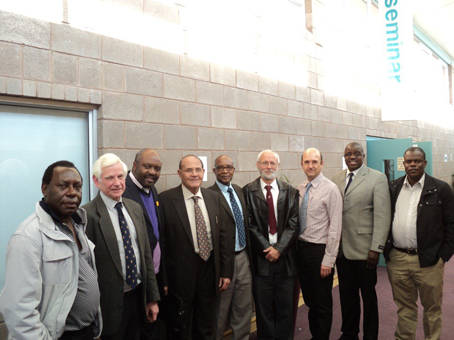
From left to right: Dr D. Katwire (UFH), Prof. P. Kaye (RU), Prof. S. Songca (WSU), Prof. J. du Preez (UPE/NMMU), Dr P. Tseki (WSU, EC treasurer), Prof. P. Loyson (NMMU, past EC Chair), Prof. E. Ferg (NMMU, EC organiser), Dr Z. Tshentu (RU, EC Chair) and Prof. P. Ajibade (UFH, EC secretary).
Prof. Jan du Preez (who will be turning 82 years of age in October 2012) travelled all the way from his retirement home in Stilbaai to attend the symposium in East London. His presentation was about "four decades of research (1967-2008) at UPE/NNMU". In his presentation, he showcased the development of research capacity at Nelson Mandela Metropolitan University (the former University of Port Elizabeth) from humble beginning to producing many postgraduate students (MSc and PhD) some of which were originally from disadvantaged backgrounds and who now are doing quite well in various industries and universities all over South Africa and beyond. He used his own experience to educate and encourage the current generation of researchers about ways of raising funds from the industry and government agencies so that the postgraduate student's bursary can be supplemented to a practical living bursary. Prof Jan du Preez also emphasised on the need to motivate the students, a good teaching practice and harmonious working relationship with administrators and cleaners as some of the reasons behind the successes of UPE/NNMU. Dr Katwire from the University Of Fort Hare, in his presentation, gave a historical perspective of the department. He stated that for many decades, the department was a teaching department fulfilling a mandate of educating black students from the former Ciskei homeland. In the last six years, with new academic staff members that are passionate about research, the department has transformed from mainly teaching to teaching and research. This culminated in the department graduating four PhDs in 2011 and a steady increase in research publications from the department. At present, the department has about thirty post graduate students but in spite of the success and progress in the department in the last few years, Dr Katwire who is at present the head of department at UFH, lamented that the department is in dire need of research infrastructure to support the department going forward. He also lamented that attempts by some staff and students to access instruments from other universities within the province has not been very effective because some of these universities have quite a number of postgraduate students that make access for Fort Hare staff limited. Thus, people from his department also go to KZN, Gauteng and the Western Cape.
In his presentation titled "Organic chemistry at Rhodes in the last 25 years", Emeritus Prof. Perry Kaye showcased "Team Chemistry" at Rhodes University. He profiled the people that make the department and the team effort of developing research in the last 25 years, especially organic chemistry that has now reached a level of theoretical and medicinal studies from persevered synthesis beginnings. He painted a picture of the Rhodes Chemistry department having 5 postgraduate students in 1987 and that now 60 registered MSc and PhD students in 2011. He stated that the department with less than ten academic staff members graduated 15 PhDs in April 2012, the first of its kind in the Faculty and the entire University. He said that the success at Rhodes was due to having the right people, an effective technical infrastructure and good institutional support system. Professor Songca, in his presentation titled "ICTs in chemistry and chemical education", emphasized the need for ICT in teaching and research in chemistry. He showcased how WSU with multi-campus on vast expanse of land has maximized the use of ICT to the benefit of the student and staff members. He stated that there is urgent need for chemistry departments in South Africa that are well resourced to make access to equipment available electronically to other researchers.
He listed the challenges to E-learning and E-research and made some suggestions for effective
implementation and concluded that in spite of the possible drawbacks, the earlier chemistry departments in South Africa are linked electronically and work synergistically, the better for the country. The chairman of the SACI EC section, Dr Zenixole Tshentu, in his concluding remarks thanked the host (WSU, Dr Tseki and Mr Manamela), the sponsors, the invited speakers and the audience for making the event a success. He raised two issues of concern: teaching curricula and the looming legislation on certification of chemists. He said there is urgent need to harmonise teaching curricula and accommodate the teaching of Analytical Chemistry (from the findings of the Analytical Chemistry Division through a consultative process with the chemical industry). He implored members to publish their research work in South African Journal of Chemistry to raise the profile of the journal and also encouraged non-members to join the SACI membership. The EC SACI membership recruitment drive will start in July/Aug 2012. The event was sponsored by the SACI national office and WSU chemistry department. The two sessions were chaired by Prof. Ernst Ferg (NNMU) and Prof. Peter Ajibade (UFH).
Written by Prof. Peter Ajibade (SACI EC secretary)
Gauteng
The major celebratory Anniversary events were held on Friday 29th June. Prior to the conference, held at the Sci-Bono Centre, a new five year MOU between the Royal Society of Chemistry and the SA Chemical Institute was signed by the Presidents of SACI and the RSC (see pictures below). This was followed by the SACI Gold Medal award speech by last year's winner Prof Casper Schutte
Other speakers gave a range of talks on Chemistry related topics.
A new booklet covering the past 25 years of SACI history and written by Prof Ivan Green was launched at the event.
The day's events were followed by a wonderful Anniversary Dinner held at the newly opened Wits Club. The cutting of the Anniversary cake that had been specially made for the occasion was one of the highlights of the evening.
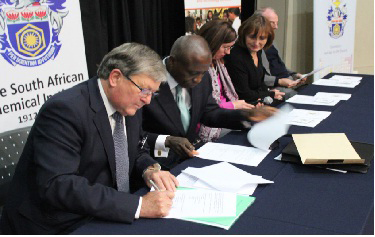
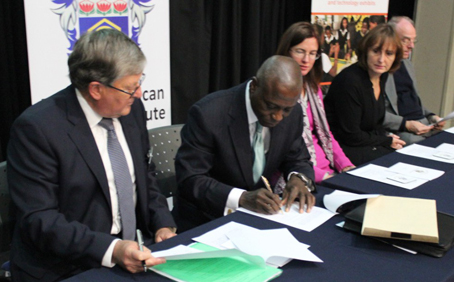
Prof David Phillips (RSC) signing the MOU and b) Prof James Darkwa (SACI) signing the MOU
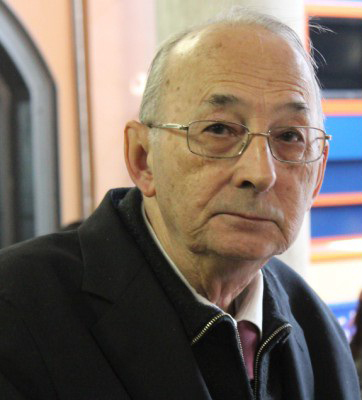
Casper Schutte, SACI Gold Medal winner 2011
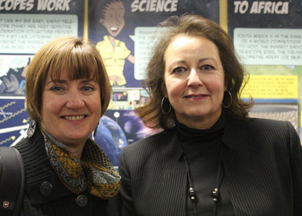

Some of the visitors: a) Denise Creeche and Nancy Jackson (ACS) and b) Yonus Chebude (Ethiopia, FASC), Vincent Nyamori (UKZN), Zeni Tshentu (U Rhodes) and Nelson Torto (U Rhodes)

The Centenary chocolate cake and b) James Darkwa cutting the cake

Delegates at lunch, Sci-Bono centre
Limpopo
SACI successes at UL
;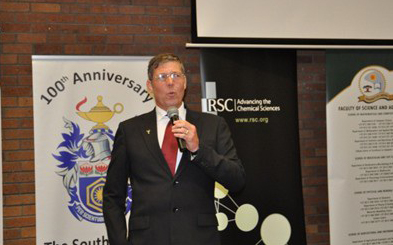
The University of Limpopo (UL) recently hosted the South African Chemical Institute (SACI) under the theme "Chemistry and Industry in Limpopo - A skills development perspective". The centenary celebration, which centred around "100 years of SACI: The Past, The Present, The Future", sought to create a forum for students and staff members to interact with different industry leaders and highlight SACI's past contributions and outline future directions for chemical sciences in SA.
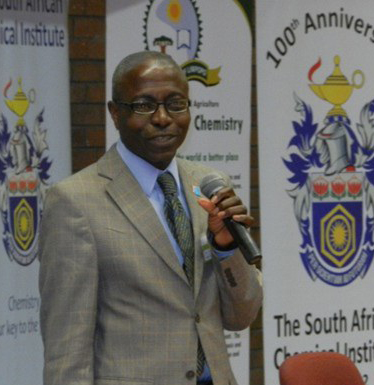
From the Speakers of the day:
Prof. James Darkwa, the current president of SACI and a former professor at UL and currently at University of Johannesburg, briefed the audience about SACI and its core mandate- i.e.to promote study, research and development in Chemistry- (both academic and industrial) and expounded on the opportunities available in the various fields in chemistry.
In his keynote address, Dr. Ian Bratt, Plant Manager at Impala Platinum, titled: "Academia to Industry; bridging the gap", said that it is crucial for chemists to acquire 'soft skills' that complement their standard qualifications to increase their career prospects.
Expounding on chemistry in government, Dr Mahlori Mashimbye, Manager of Chemical Industry and Related Services at Department of Science and Technology, said that South Africa should shift from being a mineral-based economy to a knowledge-based economy. He explained that the country targets to spend 1% of its gross domestic product (GDP) on research development.
Dr. M Makhapa the general manager of Research and development at Mintek implored the graduates of both the universities (UL & UNIVEN) to keep in touch with the latest developments in chemistry innovation process- technology push versus market pull and to be seeking out for opportunities at Mintek all the time.
Dr Irene B Kamera, Coordinator of SASOL Inzalo Foundation, motivated the students about finding opportunities in new avenues in Chemistry and industry like 'Green Chemistry, Renewable energy, Nano and atom –level chemistry, Complexities of Biological chemistry- the multi-disciplinary approach, Understanding the Life-cycle analysis approach and the Efficiency of chemical/industrial engineering processes'.
Vision and Mission of Chemistry Department
According to the head of Chemistry at UL, Dr Mary Solly Thomas, the vision of the Department is to develop the UL Chemistry into a 'world-class chemistry unit through quality education- teaching, research and community service' hence they decided on the theme 'Chemistry and Industry- a skills development perspective' for this celebration and conference.
She added that the thrust is to focus on 'core scientific knowledge, research and scientific skills and positive social attitudes and produce graduates and post- graduates with the kind of knowledge, skills and other 'social and people - based attributes' – referred to collectively as "soft skills" i.e. lofty values, attitudes and work ethics that are indeed needed in today's ever-changing world and are in dire short- supply'.
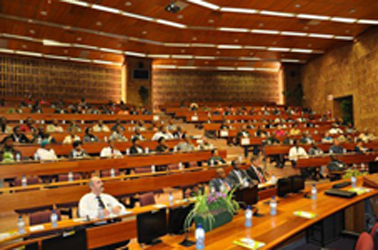
Postgraduate students from University of Limpopo and University of Venda had a seminar to present their research projects in the presence of judges. The top presenters in Honours and Masters Category were identified and the first and second positions will receive prize money of R1000.00 and R 500.00 each - sponsored by Impala Platinum and the School of Physical and Mineral Sciences.
The celebrations ended in honouring two veteran academics, Mr B. G Mafunda of UL and Prof Van Ree of UNIVEN, by awarding them with certificates of long and meritorious service.
Kwazulu Natal
The KZN Section celebrated the Institute's Centenary in the form of a dinner. This was held on 2nd August at the COMSA Lounge of the University of KwaZulu-Natal, Westville Campus in Durban. Approximately 60 members attended the function.
Professor John Field was the Master of Ceremonies for the evening. Our first speaker was Professor Siegfried Drewes, who is an Emeritus Professor of the University of KwaZulu-Natal, and the 1995 Gold Medal winner and 1966 Raikes Medal winner of the Institute. His talk was entitled: "Some characters from the past who made a difference". He had the audience enthralled with amusing and more serious anecdotes of some of the chemists from our province.
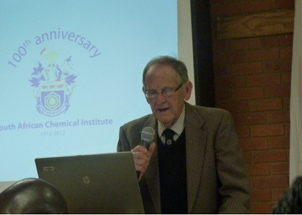
Professor Siegfried Drewes
Our second speaker was Themba Msukwini who is currently employed in the Co-operative Education Unit of the Durban University of Technology as an External Engagement Manager. He spoke on his research findings on "Perspectives of employers on the work readiness of graduates". This stimulated much discussion among the members particularly those involved in the educational sphere.
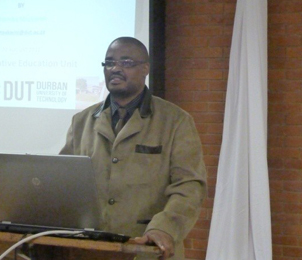
Mr Themba Msukwini
Our last speaker was Professor Tony Ford, also an Emeritus Professor of the University of KwaZulu-Natal, and a past-President, 2006 Gold medal winner, and twice AECI Medal winner of the Institute. He entertained the audience with amusing anecdotes of interesting events that happened at various conferences he has attended.
Our last speaker was Professor Tony Ford, also an Emeritus Professor of the University of KwaZulu-Natal, and a past-President, 2006 Gold medal winner, and twice AECI Medal winner of the Institute. He entertained the audience with amusing anecdotes of interesting events that happened at various conferences he has attended.

Professor Tony Ford
The Section would like to thank Council for making this event possible. It enabled members to celebrate the 100 years of the Institute's existence and catch-up with old friends and have a very enjoyable evening together.
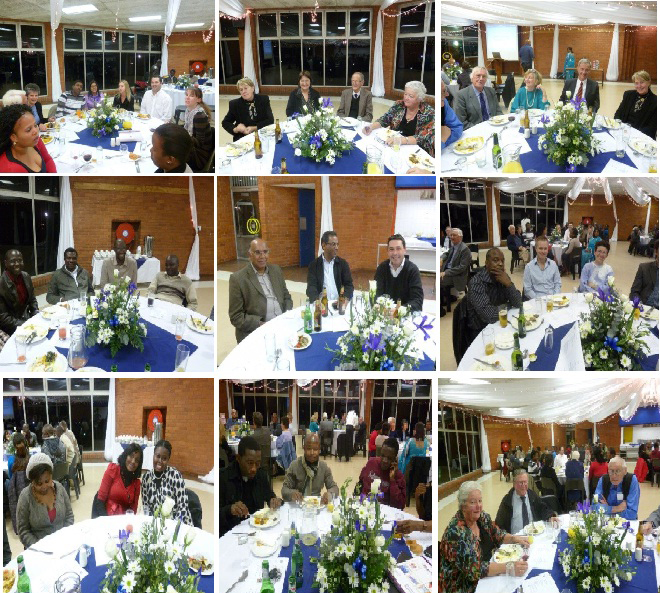
Gauteng
A successful half-day symposium titled "100 Years of Chemistry in South Africa", organised by Prof Simon Lotz, took place on the morning of 28 September 2012 in the Senate Hall of the University of Pretoria, as part of the centenary anniversary of SACI. A range of topics were covered in the presentations, including Materials Science, Biochemistry, Industrial Chemistry, Radiochemistry, Forensic Chemistry and Catalysis. This prestigious event was opened by Prof. Cheryl de la Rey, the Vice Chancellor and Principle of the University of Pretoria, and was sponsored by SACI. In the first session, chaired by Prof. Egmont Rohwer, Prof. Neil Coville from WITS presented the history of SACI over the last 100 years, followed by Dr Cathy Dwyer from Sasol, who discussed sustainability and innovation challenges experienced in the South African chemical industry. In the second session, chaired by Dr Patricia Forbes, five speakers from the Gauteng area presented their research, including Prof. Debra Meyer (Biochemistry, UP), Prof. Jan-Rijn Zeevaart (NECSA), Dr Dean Brady (CSIR), Prof. Tim Laurens (Chemistry, UP) and Dr Jessie Pillay (Mintek). Concluding remarks were made by Prof. Egmont Rohwer, and the event was followed by a luncheon.
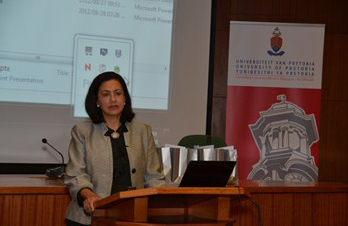
Prof Cheryl de la Rey, Vice Chancellor and Principle of the University of Pretoria, addresses the audience at the SACI Half-Day Symposium.
Report by Prof Simon Lotz
Western Cape Centenary Dinner - 30th November 2012
The grand finale of this memorable year was organised by the Western Cape Section by the Chairman, Prof Peter Mallon and his Committee and was held at the prestigious Wallenberg Research Centre in Stellenbosch and attended by 75 people.
Prof Mallon acting as the MC got proceedings off to a fine start stressing the importance of the celebrations about the role SACI has played during the past 100 years in providing a home for all qualified chemists and provides them with opportunities of attending conferences and visits by chemists from overseas. This was interspaced with well researched and amusing anecdotes. Prof Cyril O‟Conner, the one guest speaker, reminisced on his experiences which started with studying chemistry at UCT and the people who played a role and made a huge impression on his future career which ultimately led to his further studies at Stellenbosch before settling on Chemical Engineering. Prof Helgard Raubenheimer, the second guest speaker, provided an historical overview on his choice of chemistry as a career and stressed the importance of proper teaching and the skills needed to do so by staff at Universities to inspire students to think outside the conventional box and also recalled the characters in chemistry who had had an influence on his career path with some choice amusing quotes. Both talks were brief, direct, sprinkled with anecdotes and recalled people whom the more elderly audience knew and could directly associate with…indeed a wonderful evening.
Prof Mallon also handed a Misha Mrost award to Leandi van der Westhuizen as it was a most fitting occasion to do so. Again the number of younger SACI members who attended, by far the majority, was most encouraging to note and from the joviality emanating from the tables they really enjoyed the evening.
All three past presidents from the Western Cape, Profs Jimmy Bull, Graham Jackson and Ivan Green as well as 3 past Gold medallists also attended and this gave the evening some further prestige. Throughout the evening Prof Mallon, when introducing the speakers would provide some new anecdotes and these were well chosen to serve as a reminder of SACI‟s origins and its characters who have played such an important part over the past century.
In closing the evening, Prof Ivan Green, the immediate past President and who stood in for the President, indicated some the important contributions that the Western Cape Section has made to the development of the SACI structures and its historical evolution from 1912 to what we enjoy today. He highlighted a few items of which the first signing of a MOU between SACI and the RSC was but one. The second term of this historic MOU has just recently been signed as well and SACI is presently far advanced in its negotiations with the ACS for a similar MOU.
Prof Green then informed the audience of the move of SACI‟s administrative office to UKZN and that being a virtual office, SACI can essentially operate from anywhere in SA. This is the reality of what the electronic medium has become and it will thus be most interesting to follow the future development and growth of SACI at its new home. Prof Green also stressed the importance for new young members to become involved in the local structures of SACI which in conjunction with the existing collaboration with the RSC in the Western Cape and Gauteng will strengthen and sustain the programmes SACI is able to present for its Members.
Prof Green wished all a well-deserved festive season with hopefully good news in 2013.
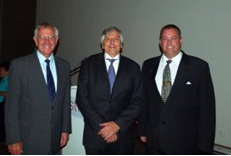
Profs Cyril O‟Conner, Helgard Raubenheimer and Peter Mallon

Gold Medalists Profs Luigi Nassembini and Piet Steyn

Students and staff at Tables
Prof I R Green: Western Cape Correspondent.
